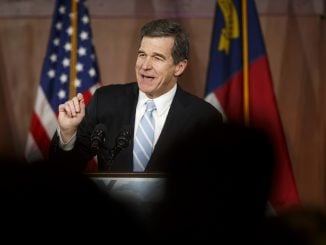
RALEIGH — The North Carolina General Assembly’s top leaders indicate legislation to amend the Emergency Management Act could move during the long session, which began in earnest on Jan. 26.
Gov. Roy Cooper first declared a state of emergency on March 10, 2020, in response to the coronavirus pandemic. At the time, he said, “We are taking the necessary steps to ensure that North Carolina is prepared and responding to this virus,” and the provisions were similar to those enacted in a natural disaster.
Within a week, Cooper closed K-12 schools and dine-in service at restaurants and bars.
The Emergency Management Act states that the governor or General Assembly may declare a state of emergency “if either finds that an emergency exists.” The act also says an area must be defined, and the state of emergency shall expire when it is rescinded by the authority that issued it.
Also included in the Emergency Management Act is a provision that gives the governor additional powers with concurrence of the Council of State. At times, Cooper has asked for concurrence on some issues — but has also said it was not something he needed.
The March order closing restaurants and bars was one example. Attorneys at the governor’s office asked Council of State members for concurrence just before a scheduled press conference announcing the decision. The Council of State members, notified via email, did not ultimately concur, yet the order was enacted.
That led then-Lt. Gov. Dan Forest to criticize the manner in which the orders were initiated, and he ultimately filed a lawsuit over the process Cooper used. That lawsuit was not successful, with Judge James Gale saying he “has not demonstrated that he is likely to succeed on the merits of his claim that the Governor has exceeded his statutory authority when issuing the challenged Executive Orders in his discretion and without the concurrence of a majority of the Council of State.”
A 2020 bill to clarify emergency powers was vetoed by Cooper after passing in the General Assembly. The bill failed a veto override vote, with some Democratic legislators who voted for the measure changing their minds and upholding the veto. Rumors were rampant that Cooper and his political team threatened some legislators if they did not stick with Cooper’s decision.
The bill would have clarified the meaning of a statewide emergency and forced reauthorization of the state of emergency every 30 days.
In a statement, Cooper said, “The Emergency Management Act clearly provides the governor with statutory authority to direct the state’s response to a public health emergency that could affect the entire state’s population… placing additional bureaucratic and administrative obligations on the declaration is a substantial change in the law and frustrates the executive branch officials’ ability to quickly and efficiently respond.”
Joseph Kyzer, House Speaker Tim Moore’s communications director, said strong support still exists for provisions in Senate Bill 105. He added that many members would like to see a time-limit provision pass.
“I think the most important aspect is the lack of time delineation. Many other states have ways for orders to be reconsidered — NC doesn’t have that. It ends when the body that issued it rescinds it,” Kyzer said.
“We think, just like in last session, there was a lot of support on the other side, and we’re hoping to turn the page. We hope the legislature can act independently. We need to work together as a body and not have the governor want to cling to unilateral control by having legislative Democrats line up behind him. We’re not trying to overturn what he’s done; we’re trying to have the governor follow the law,” added Kyzer.
Senate Leader Phil Berger (R-Eden) said in a January 2021 interview with North State Journal, “I don’t think in January of 2020 there was anyone in the state of North Carolina, whether in or out of government, who would have thought that it was possible for one person to shut the economy down or any segment of the economy.”
“The fact is there is great disagreement as to whether or not the governor has the authority to do what he’s done through executive order or should have the authority to do what he is doing via executive order. So I do think that there will be discussion, possibly even legislation, to address that,” he continued.
Berger said any changes would depend on where the majorities were. He also pointed to some legislators who flipped their votes on last year’s bill.
“I am hopeful, since we have an election behind us and the governor can’t run again, if people are in favor of a bill when it comes through the first time, they’ll be in favor of it notwithstanding the governor’s position. It strikes me as political expediency of a very questionable type for people to say they’re in favor of opening bars, but when the governor says, ‘No, they need to be closed,’ they won’t buck the governor on that. I think their constituents are not being well-served.”



